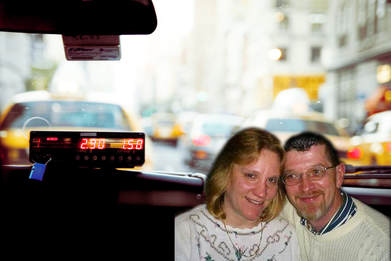Shooter of Hard-Working Cabbie
Is Found

Early on May 15, 2014, Eugene Phillips pulled his cab out his driveway. He was a hard-working man, managing two jobs to support his family. Very soon, he wouldn't have a job at all.
At 6:20 a.m., Phillips made a pickup. His passenger wore a black hoodie and sunglasses, shielding his face. After a quick "good morning" and confirming the route, Phillips drove to the destination—an alley, since the passenger wanted to be dropped off at the back entrance. The fare came to $4.60. A twenty-dollar bill was handed over. Phillips said he had no change, so a sidetrip to a convenience store was made. With the passenger still in the cab, Phillips went into the store for change.
The passenger waited for him.
They returned to the alleyway destination. The hooded passenger handed over the twenty again. Phillips received it, produced the change, and bowed his head to fill out the logbook.
"I want it all."
Phillips lifted his head from his log—and was met with the barrel of a gun. Before Phillips could deliver the money, the passenger pulled the trigger. Pain shot through Phillip's bicep and chest.
Barely conscious, Phillips continued to drive the cab. The shooter grabbed the change bag and cabbie receipts. He barked at Phillips to stop, and Phillips pulled the cab into park. Once the man exited, taking a few steps away, Phillips tugged the gear into drive and escaped. He reached a nearby hospital, barely alive. The bullet had lacerated Phillips’ liver, spleen, diaphragm, and stomach.
Had he not made it to the hospital, Phillips would have died—a fact his family is well aware of.
"Every day he has off and I have off we play the Wii and I'm so grateful I have those days," said Lacy Swain, Phillips's daughter.
While the shooter did not take Phillips’s life, he did take away Phillips’s feeling of security, several months of recovery time, and his ability to continue driving his cab. His family wanted justice for the beloved father, husband, and brother.
“I just want him to pay for what he did. Gene's a great man," Kelly Scampone, stepdaughter to Phillips, said about the shooter.
But justice didn't come. The family waited for DNA evidence taken from the cab to put an end to the search, but they were disappointed. The local Lycoming County crime lab could not identify an attacker. The lab results were uncertain, their were methods too out-of-date.
But Detective Kenneth Mains had an idea. He knew of a Pittsburgh-based company that used computer DNA testing—a scientific method that accurately analyzed data from even tiny samples. The company took the case, and the computer examined 12 evidence items.
The computer found a match statistic between the cab seat and Dante Washington. Moreover, a trail of cabbie receipts, dropped by Washington, were linked back to Eugene Phillips. The two were statistically connected—thanks to the results of robust DNA testing.
At 6:20 a.m., Phillips made a pickup. His passenger wore a black hoodie and sunglasses, shielding his face. After a quick "good morning" and confirming the route, Phillips drove to the destination—an alley, since the passenger wanted to be dropped off at the back entrance. The fare came to $4.60. A twenty-dollar bill was handed over. Phillips said he had no change, so a sidetrip to a convenience store was made. With the passenger still in the cab, Phillips went into the store for change.
The passenger waited for him.
They returned to the alleyway destination. The hooded passenger handed over the twenty again. Phillips received it, produced the change, and bowed his head to fill out the logbook.
"I want it all."
Phillips lifted his head from his log—and was met with the barrel of a gun. Before Phillips could deliver the money, the passenger pulled the trigger. Pain shot through Phillip's bicep and chest.
Barely conscious, Phillips continued to drive the cab. The shooter grabbed the change bag and cabbie receipts. He barked at Phillips to stop, and Phillips pulled the cab into park. Once the man exited, taking a few steps away, Phillips tugged the gear into drive and escaped. He reached a nearby hospital, barely alive. The bullet had lacerated Phillips’ liver, spleen, diaphragm, and stomach.
Had he not made it to the hospital, Phillips would have died—a fact his family is well aware of.
"Every day he has off and I have off we play the Wii and I'm so grateful I have those days," said Lacy Swain, Phillips's daughter.
While the shooter did not take Phillips’s life, he did take away Phillips’s feeling of security, several months of recovery time, and his ability to continue driving his cab. His family wanted justice for the beloved father, husband, and brother.
“I just want him to pay for what he did. Gene's a great man," Kelly Scampone, stepdaughter to Phillips, said about the shooter.
But justice didn't come. The family waited for DNA evidence taken from the cab to put an end to the search, but they were disappointed. The local Lycoming County crime lab could not identify an attacker. The lab results were uncertain, their were methods too out-of-date.
But Detective Kenneth Mains had an idea. He knew of a Pittsburgh-based company that used computer DNA testing—a scientific method that accurately analyzed data from even tiny samples. The company took the case, and the computer examined 12 evidence items.
The computer found a match statistic between the cab seat and Dante Washington. Moreover, a trail of cabbie receipts, dropped by Washington, were linked back to Eugene Phillips. The two were statistically connected—thanks to the results of robust DNA testing.
“This is a case about science more than I’ve ever seen,” said Assistant Public Defender Nicole Spring.
Phillips recognized Washington as his attacker, and eventually Washington confessed after being found guilty. Justice was not served until almost 4 years after Eugene Phillips was shot in his cab. Inaccurate, outdated science prevented Phillips from getting the closure he deserved to get right away.
Dante Washington was sentenced to 36-72 years in prison. Phillips admitted that he was relieved to finally see his attacker go to jail. "It's the last chapter of the book," he said. "I'm ready to move on."
DNA science should move on as well, using the computers that help all victims of injustice.
Dante Washington was sentenced to 36-72 years in prison. Phillips admitted that he was relieved to finally see his attacker go to jail. "It's the last chapter of the book," he said. "I'm ready to move on."
DNA science should move on as well, using the computers that help all victims of injustice.
© 2019 Justice Through Science. All rights reserved.

